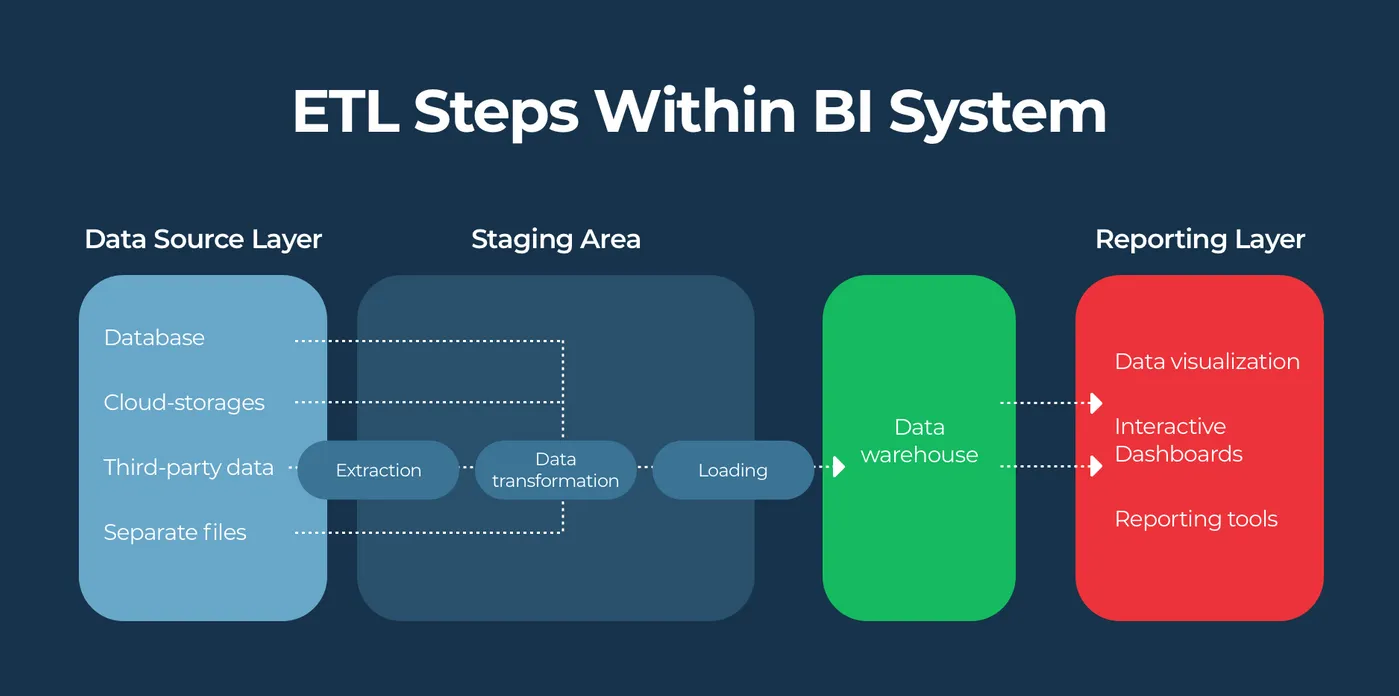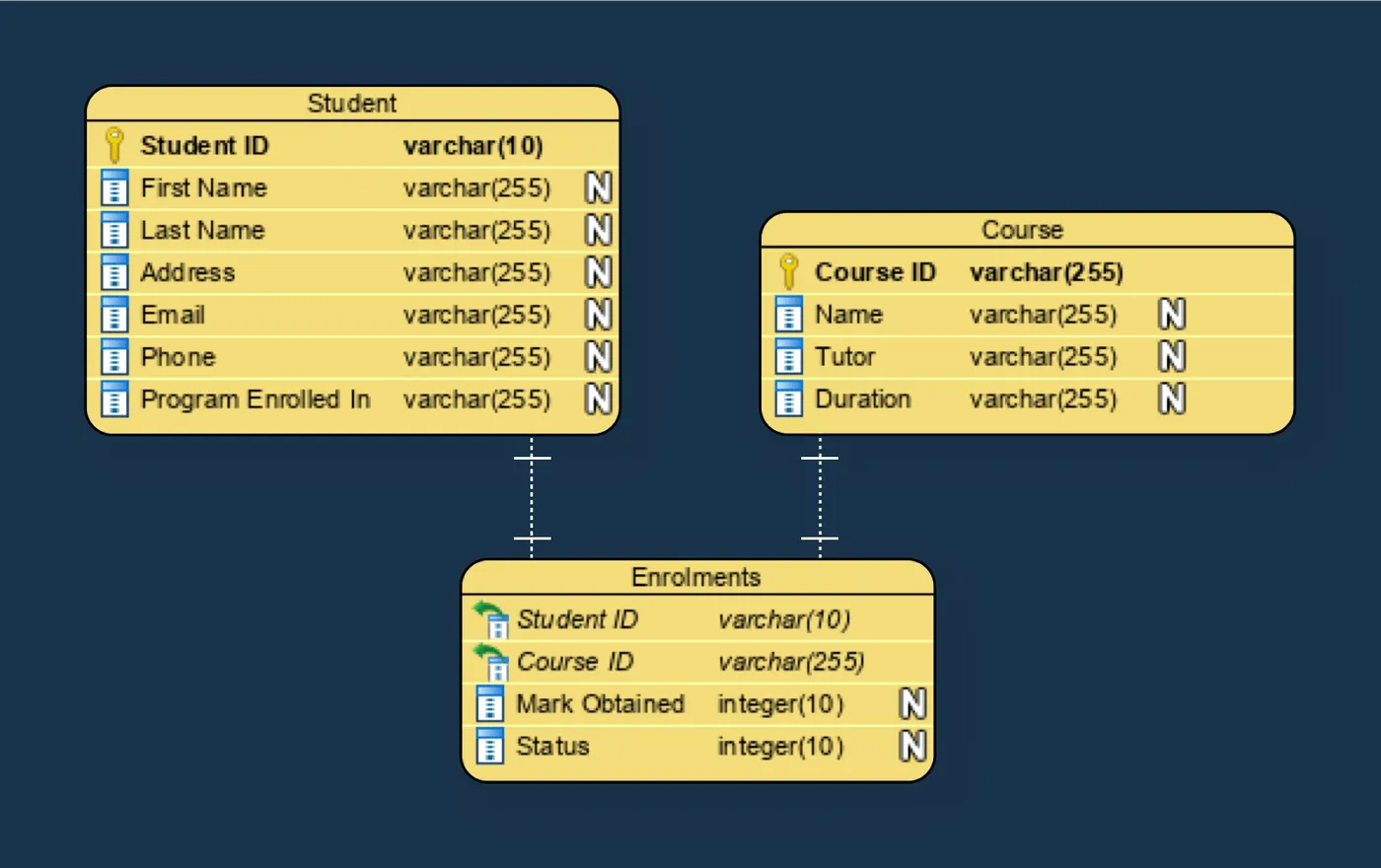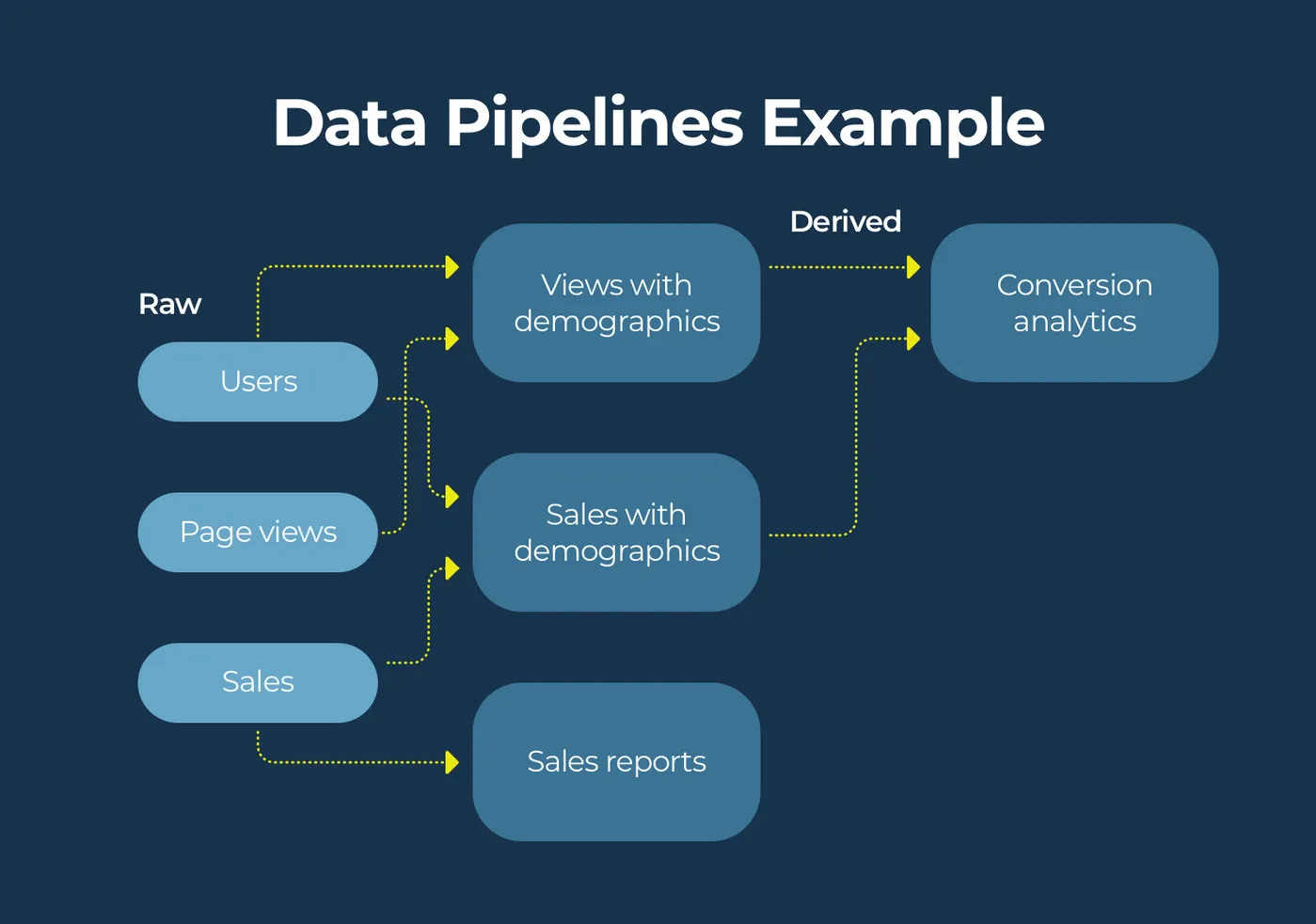What Is ETL Developer: Roles, Responsibilities, and When to Hire
Updated 05 May 2023
9 Min
2851 Views
ETL developers play a significant role in Business Intelligence. Companies need this specialist on a team to implement business data analysis. BI focuses on storing business data in one place and processing it to extract insights.
ETL developers work on extraction, transformation, and loading of data to make it useful. Without these stages, it’s impossible to display data at all, so ETL developers take an important position in the BI chain.
In this article, we’ll discuss what ETL developer is, talk about ETL developer skills, roles, and responsibilities.
ETL Developer Meaning
First things first, to understand who an ETL developer is, you need to understand what is hidden behind the ETL abbreviation.
E for Extract
All business data is stored in one place — the Data Source Layer. At the same time, all this data is divided between numerous software and structured in various formats. During extraction, ETL developers define proper data sources with the required data and assemble data from them. There can be multiple data sources like CRM, ERP, and third-party data.
T for Transform
Once data collection starts, all data needs to be stored in the place called Staging Area. While storing there, all data passes the transformation process. This process cleanses and transforms all data into proper formats that can be used for further transportation to the Warehouse Layer.
For example, lots of collected information is financial numerics stored in random formats like “0.50” cents, “03,90”, and so on. All these values will be transformed into the proper format: “$0.50”, “$3.90”.
L for Loading
It’s a final frontier of all ETL processes. All the data collected and transformed previously is loaded into the Warehouse Layer.
But that’s the case if the amount of data is huge. In other cases, any database can be used for this purpose.

ETL processes in BI chain
So, the main goals of ETL developers are:
- Data collection from various sources.
- Data transformation into proper formats.
- Data loading into the Warehouse Layer or any other database.
ETL developers prepare essential business data for other data engineering team members they work with.
Speaking of other team members...
ETL Developer as a Part of a Team
Team members usually vary from project to project and depend on the industry, company size, technologies used, and data processing tasks.
Yet, it’s possible to tell about all specialists ETL developers can work with shoulder to shoulder:
- Data architects. Design infrastructure for further development.
- Data engineers. Develop data infrastructure (interfaces, ecosystem) based on a design made by a Data architect.
- Data analysts. Work with data and define data collection methods, data models, and how all data will be transformed.
- Warehouse developers. Build and maintain data storages and databases.
- Database admins. If there’s more than one database, a database admin comes to rescue managing them.
- BI developers. Make the proper visualization of all data fancy and useful. Responsible for developing the right data representation tools, also known as BI interfaces.
ETL Developers’ Roles and Responsibilities
As mentioned before, the ETL developers play an important role in the BI. That’s because they’re responsible for collecting, transforming, and sending data through the chain in the proper format up to the Warehouse Level. But their responsibilities aren’t limited to that.
Among other ETL developer responsibilities are the following:
- ETL process management
- Data modeling
- Warehouse architecture modeling
- Data pipeline creation
- ETL tools development
- Testing (QA, ETL)
Let’s talk about each one of them in detail.
ETL Process Management
It’s an essential stage of data processing. The main goals of ETL developers at this stage are:
- Define the general view of the ETL process and establish the boundaries of data processing.
- Build system architecture for the whole data pipeline.
- Draw up tech documentation for system requirements.
- Participate in the development and implementation of ETL tools.
- Test tools to make sure that they work as expected.
To sum things up, ETL developers can combine many roles: engineer, tech lead, Project Manager, and Quality Assurance engineer. It depends on the business scope.
Data Modeling
Defining data models is a crucial step before extraction data from the Source Layer. Data models are final data formats that’ll be represented in the Warehouse Layer. These models help ETL developers determine the whole transformation stage and what tools are needed to transform data into the right formats.
Since this step is crucial for the whole process of ETL, development of these data models goes in cooperation with data analysts, data scientists, and business analysts.

Logical data model. Source: Visual Paradigm
Warehouse Architecture Modelling
To define ETL developers' main purpose in this task, we’ll briefly describe what the Warehouse Layer is. All transformed data is stored in the Warehouse Layer. This layer is broken down into various small databases called data marts. Data marts usually consist of some specific data like annual ROI, invoices, and so on. The whole Warehouse Layer (including data marts) is connected to the BI interface. In turn, end-users interact with that interface to request certain data.
Defining the right architecture of Warehouse and picking the right tools for proper data loading are the main objectives of ETL developers during warehouse architecture modeling. Moreover, ETL developers can build a Warehouse Layer from scratch if they have knowledge and skills of warehouse developers.
Data Pipeline Creation
Data pipeline is a unified infrastructure that automates the main tasks and is crucial for the whole ETL. Development of these pipelines is one of the main ETL developer tasks.
Data pipeline is responsible for the following tasks:
Data extraction
Data is extracted from all sources where it's stored. To maintain correct extraction, ETL tools must be integrated into each data source.
Staging area uploading
All extracted data must be transferred into a temporary storage. This storage is the staging area. Moreover, the staging area is where all data transformation happens.
Data transformation
This process is vital to make all raw data fit into the predefined standards. Depending on standards, data may pass various stages like cleansing from useless data fields, determining data types, adding metadata to bring more detail.
Warehouse uploading
When data transformation is finished, it’s time to load all structured data into the Warehouse Layer. The data can be loaded by parts. However, query methods can be used in case of dynamic information requiring constant updates.

Simple data pipelines
ETL Testing
Usually, ETL developers run data tests in cooperation with data scientists. During all ETL stages, there are a lot of things to test:
- Data. Overall data completeness, metadata validation, syntax-check, after-transform check.
- Data models. Their compliance with business requirements.
- Warehouse layer testing. Architecture.
- Data flow.
- Integration testing. Correct data downloading to Warehouse layer.
- Overall ETL system performance. Data loads/uploads within defined timeframes.
All these aspects can be checked using special testing tools like iCEDQ, Talend Open Studio, and Datagaps ETL Validator. They can perform automation quality assurance testing.
Want to improve your knowledge of testing methods? Learn all strengths and weaknesses of automation and manual testing.
ETL Developer Skills
The ETL developer’s role is pretty complex and requires experience in several fields. In general, ETL developers must have experience in software development and database engineering. Besides, great business and industry understandings are a must.
Let’s discover all skills needed for a professional ETL developer.
Extensive Experience With Pre-Made ETL Tools
ETL developers can use pre-made ETL tools to perform data extraction, transformation, and loading. There are a lot of solutions on the market that can perform this task out of the box. The most popular are CloverDX, Xplenty and Sybase ETL. To handle and integrate them properly, ETL developers must have experience with those or similar tools.
Solid Database Engineering Background
Without this fundamental knowledge, ETL developers won’t be able to build warehouse architecture design from scratch. Moreover, to correctly define data storage requirements, ETL developers must be experts in SQL and NoSQL databases along with data mapping.
Strong Data Analysis Skills
Strong data analysis skills are a must-have since ETL developers are involved in the data modeling process, data mapping, and formatting.
Great Knowledge Base of Scripting Languages
Even though pre-made tools are often used in ETL, business requirements may vary from project to project, and additional tweaks are required sometimes.
In this case, knowledge of various scripting languages will come in handy. The most popular scripting languages in ETL are:
- Perl
- Bash
- Python
Want to learn more about Python used by companies? Discover the strengths of this programming language and famous companies using it.
Furthermore, scripting languages simplify the overall workflow with large databases since some processes may be automated using them.
Solid Data Modeling Skills
Data models are a very important part of the whole ETL process. Since data models are the cornerstone in picking the right data transformation tools, the ability to read, analyze, and build data models will help in further ETL processes. When the whole data model is clear for ETL developers, they can figure out the appropriate data formats that should come out after the data transformation step.
Putting All Skills Together
Now let’s sum up must-have skills for ETL developers:
- Experience with pre-made ETL tools (CloverDX, Xplenty, Sybase ETL).
- Database engineering background (SQL/NoSQL, data mapping).
- Data analysis skills.
- Scripting languages knowledge (Perl, Bash, Python).
- Data modeling skills.
When Does a Company Need an ETL Developer?
Not every company needs an ETL developer. If the company is small and operates a moderate amount of data, ETL developers won’t bring much value.
Companies need ETL developers when:
- They’re on its steady rise and the amount of data is growing rapidly.
- They’ve recently built a large-scale data processing system or there’s a need to update the existing one.
- They constantly process existing business data or their main business scope is machine learning
Wondering what is the use of machine learning in business? Learn more about its advantages and benefits for business.
Wrapping Things Up
Managing business data is not an easy process, especially if a business is large and operates an enormous amount of data. ETL developers can organize all business data to bring more value to the company. Using a wide variety of professional skills and cooperating with other data specialists, ETL developer is an important gear in the whole BI mechanism.
The main goals of ETL developers are:
- Data collection from various sources where all business data is stored
- Data transformation into proper formats
- Data loading into Warehouse Layer or any other database
In a word, ETL developers prepare all vital business data for other data engineering team members.
We can highlight several tasks that are in the responsibility zone of ETL developer:
- ETL process management
- Data modeling
- Warehouse architecture modeling
- Data pipeline creation
- ETL tools development
- Testing (QA, ETL)
Every ETL developer must have these skills to fulfill ETL processes properly:
- Experience with existing ETL tools (CloverDX, Xplenty, Sybase ETL)
- Database engineering background (SQL/NoSQL, data mapping)
- Data analysis skills
- Scripting language knowledge (Perl, Bash, Python)
- Data modeling skills
ETL can work shoulder to shoulder with these specialists:
- Data architects
- Data engineers
- Data analysts
- Warehouse developers
- Database administrators
- BI developers
ETL developer is a specialist who works on data extraction from the source database, the transformation of this data into the proper format, and loading this data to the Warehouse layer. In the Warehouse layer, all data can be worked with for proper data representation to the end-user.
ETL developer responsible for:
- Data extraction from the source
- Transformation of this data into a proper format
- Loading data into the Warehouse Layer

Evgeniy Altynpara is a CTO and member of the Forbes Councils’ community of tech professionals. He is an expert in software development and technological entrepreneurship and has 10+years of experience in digital transformation consulting in Healthcare, FinTech, Supply Chain and Logistics
Give us your impressions about this article
Give us your impressions about this article
Comments
4 commentsNever thought that ETL developer is such an important figure in the BI system. Thanks for the info!
Are there any other useful ETL tools that all ETL developers should be experienced with? I recently made a step on the ETL learning route, and it's really interesting to me. Thanks for the article!
This image that describes ETL processes in the BI chain is really helpful. All articles made the explanation so complicated but your article put all things together in a simple way. Much obliged!
Outstanding explanation of this complicated topic. Thanks a lot!

Thanks for kind words, Javier. You're welcome!